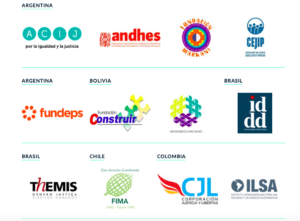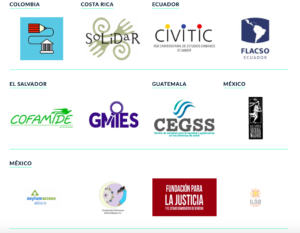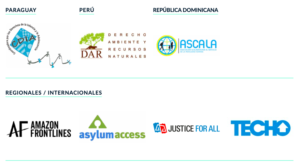Lee el pronunciamiento en español aquí.
COVID-19: TO LEAVE THE CRISIS BEHIND, RIGHTS MUST COME FIRST
In the face of the COVID-19 global pandemic, the signatory organizations, members of the Global Legal Empowerment Network in Latin America, call on our states, the private sector, local governments, international organizations, and other relevant authorities to guarantee the rights of vulnerable populations and to prevent this situation from deepening the already existing inequalities in our societies. We call on them for the adoption of holistic and inclusive public policies, and the implementation of mechanisms that help people to know their rights and how to enforce them.
The global COVID-19 outbreak, together with the measures to prevent its spread and contain the pandemic, are not affecting us all in the same way. There are some at-risk groups for whom the effects of infection by the virus present the greatest harm. There are also especially vulnerable groups, who are being placed in an increasingly excluded and vulnerable position by countermeasures and collective precautions.
In order to leave no one behind, states in the region must prioritize the assistance of those that need the most support. Approaches to this health emergency must guarantee the right to health for everybody, without discrimination. To do so, the broad inequalities existing in Latin American societies must be accounted for. Resources must be distributed according to need, making sure that this emergency doesn’t displace, marginalize, impoverish, and increase the vulnerability of those living in the most difficult circumstances [1].
HOUSING: Among the most affected, we must think about people affected by homelessness, for whom the #stayathome slogan is impossible to fulfill and who require urgent assistance. Similarly, those living in informal settlements or low income neighborhoods, as well as refugee and IDP[2] camps, suffer from lack of access to such basic services as potable water and healthcare. They also live in overcrowded spaces, making so-called “social distancing” difficult and creating potential hotspots for the spread of the virus [3]. As the United Nations Special Rapporteur on Adequate Housing says, “Housing has become the front line defense against the coronavirus. Home has rarely been more of a life or death situation”. [4]
WORKERS: Without a doubt some of the most affected by this crisis are informal workers (who represent a large part of the population in the region’s big cities), unemployed workers, or workers with low wages. These people are compelled to continue working to earn an income, increasing their exposure to the virus under worsening job conditions, or else they lose their jobs and wages. Women, who are significantly engaged in informal and unpaid labor, are one of the most affected groups.
GENDER-BASED VIOLENCE: Confinement measures and restrictions on mobility increase the risks and obstacles for girls and women who are victims of gender-based violence, and who are forced to stay at home with their aggressors. As a recent report by UN Women recommends, “To recognize the impact of COVID-19 on women and girls, and ensure a response that addresses their needs and guarantees their rights is key to strengthening prevention, response and recovery efforts.” [5]
EXCESSIVE USE OF FORCE BY SECURITY FORCES: The potential use of measures adopted in the face of Coronavirus to repress, persecute, silence and even kill grassroots groups, social leaders, and human rights defenders is of particular concern. A group of rapporteurs and experts of the United Nations Human Rights Council affirmed that “emergency declarations based on the outbreak must not be used as grounds to target specific groups, minorities or individuals, nor work as an excuse for repressive actions with the pretext of protecting health. They mustn’t serve either to silence the work of human rights defenders”. [6]
MIGRANT PEOPLE are another of the highly affected groups in the current context. On the one hand, they are completely vulnerable to the denial of basic services and assistance of any kind, in addition to lacking a support network. On the other hand, the increased show of public force on the streets to enforce confinement measures and restriction of movements, combined with the demand of documentation and the implementation of other measures justified under extraordinary circumstances, elevates the deportation risk for people whose immigration status is in question. Migrants must also contend with xenophobic behaviour and other episodes arising from the socioeconomic crisis generated by the spread of the virus. In this context, migrant people will likely avoid accessing the health system or providing information about their health for fear of repercussions on their immigration status. [7]
INCARCERATED PEOPLE in correctional facilities along the region are also highly affected, due to the overcrowded conditions in which they live, with low hygiene standards, and lack of access to basic services. Multiple governments have implemented preventive measures that affect the rights of incarcerated people, such as the reduction of visiting hours by relatives. The legal processes of many incarcerated people are also impacted.
ETHNIC COMMUNITIES AND INDIGENOUS PEOPLES require broader and special protection, due to the impact that this pandemic can have on their communities and the territories that they safeguard. The health of most indigenous peoples is already compromised due to the high prevalence of introduced infectious-contagious diseases[8] and chronic non-communicable diseases, which is aggravated by the persistance of inequality, exclusion, and discrimination in their access to goods and services, as well as by the relative geographical isolation of their territories. The establishment of culturally appropriate communication and information strategies is therefore fundamental. The IACHR made a special call to states “to observe the utmost respect for noncontact with indigenous peoples or segments of indigenous peoples living in voluntary isolation, given the grave effects that contracting COVID-19 could have on their survival”. [9]
In this context, regional governments have progressively started implementing various health and social containment measures, as well as economic, fiscal, and monetary measures, such as increasing social expenditures, suspending the payment of bank credits, freezing the surcharge for non-payment of water services, actions to prevent the shortage of basic supplies[10], specific economic subsidies, and specific measures to regulate the housing market, among others.
Nevertheless, for these policies and measures adopted by states to be effective, the commitment of all stakeholders – in particular, of the private sector – is required. These policies and measures must be coordinated among social sectors, and people must be aware of their rights and of the mechanisms established for their enforcement. Just as the virus spreads rapidly, public policies are also being adopted rapidly, with new measures almost every day. In this scenario, access to information is a key component of the action plan against Coronavirus. Fake and unverified information spreads fast, causing alarmism and confusion. It is therefore a key priority to adopt mechanisms for people to know and use the law, and to participate in the discussions around the public policies that affect them.
As for us, we will be monitoring public policies adopted in our countries to guarantee that the pandemic is not used as an excuse to promote unfair and discriminatory policies. We will stand side by side with the communities that we work with, so that they have all the information they need to exercise their rights and protect their health, as well as air to grievances relating to policies that by action or omission violate their rights.
The adoption of measures in the face of this pandemic by the different states in the region can indicate that states are taking the right to health seriously. This, we would celebrate. However, we must also demand that they take all other rights seriously, in particular those of the most vulnerable communities in our societies.
Signatory organizations:



Endorsed by (organizations):
Árboles Sin Fronteras Ecuador (Ecuador)
Asociación Amistad y Mucho Más (Colombia)
Asociación Cooperativa Manos Diligentes (Venezuela)
Bernstein Institute for Human Rights at NYU School of Law (United States)
elConjuro Editorial (Ecuador)
Cineclub Tena (Ecuador)
Cinecyclo Ecuador (Ecuador)
Comisión Colombiana de Juristas (Colombia)
Frente de Artistas Audiovisuales de Tigre (Argentina)
Fundación FENIXE (Ecuador)
International Organisation for Women in the Seafood Industry (France)
Misión Salud (Colombia)
MUNDOSUR (Argentina)
Sinergia (Ecuador)
USBRMC (Bangladesh)
Endorsed by (individuals):
Agustin Alegre (Argentina)
Ahmed Ismail (Kenya)
Angela Acosta (Colombia)
Carlo Peñaherrera (Ecuador)
César Eduardo Galarza (Ecuador)
Chrysoula Mela (Greece)
Diana García (Guatemala)
Eugenia D’Angelo (Argentina)
Gustavo Gallón Giraldo (Colombia)
Jorge Bravo (Ecuador)
Jose Victor Sanchez (Colombia)
Manju Menon (India)
Marcia Ramos (Dominican Republic)
Marie Monfort (France)
Martha Su Feraud (Ecuador)
Natalia Roca (Ecuador)
Nieves Rodríguez (Dominican Republic)
Sajid Khan (Bangladesh)
Sukti Dhital (United States)
Vanina Saucedo (Argentina)
Veronica Bobone Julio (Mozambique)
Verónica Solórzano (Ecuador)
Walter Fernandez Ulloa (Ecuador)
Xavier Salazar (Ecuador)
Yhoanna Diaz (Dominican Republic)
1. Tørres, Liv. (2020). SDG 16+ – The key to managing the COVID-19 crisis. Pathfinders for Peaceful, Just and Inclusive Societies. See: https://medium.com/sdg16plus/sdg16-the-key-to-managing-the-covid-19-crisis-f3f5cb577699
2. Internally displaced people
3. OHCHR. (2020). “Housing, the front line defence against the COVID-19 outbreak”, says UN expert. See: https://www.ohchr.org/EN/NewsEvents/Pages/DisplayNews.aspx?NewsID=25727
4. OHCHR. (2020). “Housing, the front line defence against the COVID-19 outbreak”, says UN expert. See: https://www.ohchr.org/EN/NewsEvents/Pages/DisplayNews.aspx?NewsID=25727
5. ONU Mujeres. (2020). COVID-19 en América Latina y el Caribe: Cómo incorporar a las mujeres y la igualdad de género en la gestión de la respuesta a la crisis. P. 3. See: https://www2.unwomen.org/-/media/field%20office%20americas/documentos/publicaciones/2020/03/briefing%20coronavirusv1117032020.pdf?la=es&vs=930 . Original quote: “Reconocer el impacto del COVID-19 en las mujeres y niñas, y asegurar una respuesta que aborde sus necesidades y garantice sus derechos es central para fortalecer los esfuerzos de prevención, respuesta y recuperación.”
6. Noticias ONU. (2020). Los planes de emergencia contra el coronavirus no pueden utilizarse para reprimir los derechos humanos. March 16, 2020. See: https://news.un.org/es/story/2020/03/1471202. Original quote: “las declaraciones de emergencia basadas en el brote no deben utilizarse como base para dirigirse a grupos particulares, minorías o individuos, ni funcionar como una excusa para la acción represiva con el pretexto de proteger la salud. Tampoco deben servir para silenciar el trabajo de los defensores de los derechos humanos”.
7. United Nations Network on Migration. (2020). COVID-19 does not discriminate; nor should our response. See: https://www.unicef.org/press-releases/covid-19-does-not-discriminate-nor-should-our-response
8. Departamento de Asuntos Económicos y Sociales, Pueblos Indígenas. (2020). Salud. ONU. See: https://www.un.org/development/desa/indigenous-peoples-es/areas-de-trabajo/salud.html
9. OEA. (2020). IACHR and OSRESCER Urge States to Guarantee Comprehensive Protection for Human Rights and Public Health during the COVID-19 Pandemic. March 20, 2020. See: http://www.oas.org/en/iachr/media_center/PReleases/2020/060.asp
10. CEPAL. (2020). COVID-19 tendrá graves efectos sobre la economía mundial e impactará a los países de América Latina y el Caribe. See: https://www.cepal.org/es/comunicados/covid-19-tendra-graves-efectos-la-economia-mundial-impactara-paises-america-latina


